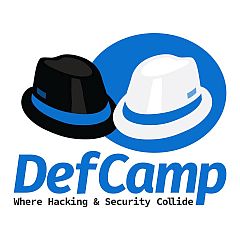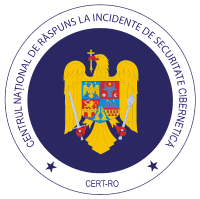This site is the archived OWASP Foundation Wiki and is no longer accepting Account Requests.
To view the new OWASP Foundation website, please visit https://owasp.org
OWASP Bucharest AppSec Conference 2016
|
|
CONFERENCE (Thursday 6th of October) | ||
| Date | Location | |
| Thursday 6th of October, 8.00 AM |
Venue Location: Iridium Room Workshop: Oregon and Nevada Rooms Venue Address:Sheraton Bucharest Hotel , Calea Dorobantilor 5-7, Bucuresti, ROMANIA; | |
| Price and registration | ||
| The conference entrance is FREE, you need to register on the link provided below, print your ticket and present it at the entrance. General Registration |
||
Sponshorship opportunities
Why sponsor?
- Join 300+ leaders, security consultants, security architects and developers gathered to share cutting-edge ideas, initiatives and trends in technology.
- OWASP events attract an audience interested in "What's next?" - As a sponsor, you will be promoted as an answer to this question.
- Increase awareness and recognition in Romanian Security IT environment.
- Support and involvement in the world of information security enthusiasts.
Conference agenda | |||||
| Time | Title | Speaker | Description | ||
| 8:30 - 9:00 (30 mins) |
Registration and coffee break | ||||
| 9:00 - 9:15 (15 mins) |
Introduction | Oana Cornea | Introduction to the OWASP Bucharest Event, Schedule for the Day | ||
| 9:15 - 10:00 (45 mins) |
Handling of Security Requirements in Software Development Lifecycle | Daniel Kefer | The bigger the company you're working in, the more technologies and methodologies used by development teams you are going to face. At the same time, you want to address security risks in an appropriate, reliable and traceable way for all of them. After a short introduction of a unified process for handling security requirements in a large company, the main part of the talk is going to focus on a tool called SecurityRAT (Requirement Automation Tool) which has been developed in order to support and accelerate this process. The goal of the tool is first to provide a list of relevant security requirements according to properties of the developed software, and afterwards to handle these in a mostly automated way - integration with an issue tracker being used as a core feature. Work in progress and future plans will form the last part of the talk. | ||
| 10:00 - 10:45 (45 mins) |
CSWSH (Cross-Site Wbsocket Hijacking) Compromising websockets with an XSS vulnerability | Vali Malinoiu | The relatively new technique to allow full duplex communication between client and server is gaining more and more attention from developers in order to build realtime web applications. During the process they open their application to a vulnerability sometimes called CSWSH. | ||
| 11:00 - 11:40 (40 mins) |
Software assurance with OpenSAMM Part I | Jacco van Tuijl | More and more developers realize that something needs to change into their development process. This is to reduce the number of vulnerabilities and to be well prepared when incidents are reported. The Secure Software Development Life Cycle process ( SSDLC ) ensures that there is thought to security at all stages of the development process. This reduces the number of vulnerabilities in delivered software and provides a thorough process for handling incidents. | ||
| 11:50 - 12:30 (40 mins) |
Software assurance with OpenSAMM Part II | Jacco van Tuijl | There are several frameworks for the implementation of SSDLC like BSIMM , MS SDL and OpenSAMM . Jacco van Tuijl will discuss the OpenSAMM : The Software Assurance Maturity Model. A completely open framework of OWASP. Jacco will share experiences regarding the implementation of OpenSAMM within various organizations. | ||
| 12:30 - 13:30 (60 mins) |
Lunch/Coffee Break | ||||
| 13:30 - 14:15 (45 mins) |
How to handle bot threats | Andrei Daniel Oprisan | This talk is an overview, from a security perspective, of the robotic systems (bots) that we can find today over the internet. It consists of two main parts: Robot Detection and Robot Mitigation. I will explain how the detection models can be applied in preventing the robots to harm the website but also explaining why it is important not to affect the user experience in a significant way. | ||
| 14:15 - 15:00 (45 mins) |
Mass-analyzing a chunk of the Internet: The Romanian IT landscape | Alexandru George Andrei | Scanning the internet is a bad idea. It's what bad guys do everyday. Looking for misconfigurations, vulnerable servers, unpatched critical vulnerabilities and IoT devices in a fun, informative and "non-intrusive way" to determine just how vulnerable Romania is. From the defensive side, we are going to be able to tell precisely how many sistems are still vulnerable to heartbleed and other critical vulnerabilities exposed in the last years, how many systems are could be used in a DDoS attack (NTP amplification or otherwise), survey all SSL certificates and implementations and get a good view of the IT assets that are publicly facing in Romania. | ||
| 15:00 - 15:15 (15 mins) |
Coffee break | ||||
| 15:15 - 16:00 (45 mins) |
Static application Security Testing (SAST) to combat the risk to web and mobile applications | Moni Stern | Application security is the number one priority of security professionals, but developers just want to code. Getting developers to use Application Security Testing is one of the biggest challenges facing security professionals today. How can both be accomplished. | ||
| 16:00 - 16:45 (45 mins) |
It’s time to go hunting! Indicators of Compromise vs. Indicators of Attack | Octavian Savin and Mihai Capraru | Cyber defense isn't a new domain anymore and it is in a continuous change. A few years ago the boundary defense approach was the state of the art in this field, but now we are facing a multi-layered one with complex mechanisms, ranging from user behavior analysis to advanced threat hunting. For many years now a very effective solution for identifying computer infections was the utilization of Indicators of Compromise in different formats, but the evolution of malware complexity has made the development of IOCs a time consuming action. | ||
| 16:45 - 17:00 (15 mins) |
Closing ceremony | OWASP Bucharest team | CTF Prizes | ||
Workshop | |||||
| Time | Title | Trainers | Description | ||
| 9:00 - 17:00 |
OWASP Top 10 Vulnerabilities – Discover, Exploit, Remediate |
Adrian Furtună – Founder & Ethical Hacker – VirtualStorm Security Ionuţ Ambrosie – Security Consultant – KPMG Romania |
Description:The purpose of this workshop is to increase the participants’ awareness on the most common web application vulnerabilities and their associated risks. We will discuss each type of vulnerability described in the OWASP Top 10 project and we will be practicing manual discovery and exploitation techniques. Furthermore, a set of useful security testing tools will be presented and used during the workshop.
Of course, we will also present safe ways in which the identified vulnerabilities can be eliminated or mitigated in production environments.
Seats available: 20 (first-come, first served) | ||
| 9:00 - 17:00 |
Secure Web Applications in Java |
Cristian Serban- AppSec Architecture Manager Lucian Suta - Software Security Trainer and Consultant |
Description: Everybody is familiar with OWASP Top 10, but how is that applicable when you write Java web applications using the Spring Framework, JSP, or FreeMarker templates? What are the security features built into the most common Java frameworks and how to apply security principles such as ‘defense in depth’ in order to build robust applications. Together we will build secure coding and secure code review skills, uncover and protect against some of the most common vulnerabilities in Java code. Intended audience: Web application developers, security testers, quality assurance personnel, people passionate about web security Seats available: 20 (first-come, first served)
| ||
| 9:00 - 17:00 |
Shellcode Development and Exploiting |
Razvan Deaconescu- Assistant Professor at University POLITEHNICA of Bucharest Mihai Țigănuș - Master Student at University POLITEHNICA of Bucharest |
Description: Shellcodes are small pieces of executable code that provide arbitrary functionality to a given program. They are usually obtained from assembly source code and used in runtime application security to exploit a vulnerability in the program and alter the execution flow, i.e. arbitrary code execution attack. In this training we will provide you with the know-how and skills to create shellcodes and construct basic attack vectors using shellcodes. You will better understand how programs and processes work. The training is highly practical. We will use a Linux environment and common Linux tools for static and dynamic analysis, shellcode creation and exploiting. The training will feature hands-on activities such as:
We will present different scenarios for vulnerable programs and then create the shellcode-based attack vectors to exploit them. Outcome: After this training you will be able to create shellcodes and assembly-based binary blobs and use them for for exploiting or executable hardening. You will increase your skills in using assembly language and in working with binary exploration tools. You will understand shellcode-based attacks and you will gain basic understanding of shellcode-based attack requirements and how to mitigate them. Intended Audience: System-level developers, security researchers, people interested in runtime appplication security and binary exploitation
Seats available: 20 (first-come, first served) | ||
| 9:00 - 17:00 |
Practical Cryptography on the Internet |
Sergiu Costea - Security Researcher at University POLITEHNICA of Bucharest | Description: Cryptography is used throughout the Internet to keep information safe. It is everywhere, from banking security tokens to Youtube streams. Simply authenticating into Facebook performs tens of different cryptographic operations to establish a secure connection. Cryptography mostly operates under the hood — we use it without having to worry about how it works. However, when something in the crypto world cracks, it cracks loudly. Heartbleed, compromised certificate authorities, identity theft, mass surveillance, bitcoin exploits worth millions of dollars — they all originate in the complex layer of cryptographic algorithms and have negative impact on our lives. In this session, we will take a very practical look at cryptography and see how it works on the Internet. Some of the topics we will cover include:
The training will feature many guided hands-on activities. These include, but are not limited to: creating certificate hierarchies, configuring custom certificates on clients and servers, modifying security policies, impersonating “seemingly secure” identities, downgrading connections, and extracting information from secure HTTPS sessions. We'll also explore how easily crypto breaks when used improperly, looking back at notable recent attacks and what made them possible. Outcome: After this training you will be able to:
Intended Audience: Network and web security engineers, security researchers, web developers Skill Level: intermediate, basic Linux command line skills, basic knowledge of networking, basic knowledge of HTTP
Seats available: 20 (first-come, first served) | ||
Team
Organizers:
CTF:
Logo design:
- Andrei Jurca [7]
Volunteers:
Sponsors
Platinum Sponsors |
||||||

|

|
|||||
Gold Sponsor |
||||||
| |
||||||
Silver Sponsor |
||||||

|
  | |||||
Event Supporters |
||||||

|

|

|
||||
| |

|

|
||||

|

|
|||||
